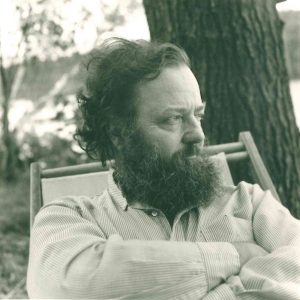Olga Umansky, MLIS, is a librarian and archivist of the Hanns Sachs Library at BPSI. Her remarks below originally appeared in the Winter 2021 issue of the library newsletter, which can be read here.

BPSI Candidate Member, John Martin-Joy, MD, trusted our archives with a fascinating and moving assortment of his correspondence with, and interviews of, a prolific American poet, Donald Hall (1928-2018). Donald Hall published fifteen books of poetry, as well as numerous essays and books across various genres. He was the Library of Congress’s 14th Poet Laureate (2006) and the recipient of many prestigious awards, including the Robert Frost Medal (1998) and National Medal of Arts (2010). Since the 1970s, Hall lived at the Eagle Pond Farm, in Wilmot, New Hampshire, and was married to another poet, Jane Kenyon.
Martin-Joy’s correspondence with Donald Hall started as a fan mail and evolved into an interview on aging, creativity, and loss that appeared in TriQuarterly magazine (Sep 13, 2016), and finally led to an edited collection of Hall’s interviews Conversations with Donald Hall (just published by University of Mississippi Press). Hall’s interviews reveal he was much influenced by psychoanalysis, sought psychotherapy during his time as a professor at the University of Michigan, thoroughly read Freud, and wrote profoundly about loss. His struggles to come to terms with Kenyon’s death to leukemia at the age of 47 became the subject of his 1998 book Without. Kenyon, who met Hall when she was a student at Michigan, wrote many searing poems about depression. In addition to letters and transcripts of interviews, Martin-Joy’s donation includes three photographs of Donald Hall by Jane Kenyon as well as three books by Hall and one by Kenyon, from Hall’s personal collection at Eagle Pond Farm: Hall’s Life Work (Beacon Press, 1993), Without (1998), The Selected Poems of Donald Hall (2015), and Kenyon’s Otherwise: New and Selected Poems (1996). Even though Hall’s and Kenyon’s larger archives are held at the University of New Hampshire, this distinctive assortment will inspire BPSI members and friends to seek solace in the language of poetry. Describing similarities in ways psychoanalysis and poetry depend on language, Adam Phillips once noted:
…psychoanalysts invoke poetry and poets wherever their repressed skepticism about language and knowledge begins to come light… The poet tends to become the cure for that founding skepticism… Psychoanalysis was unconsciously devised, perhaps, to find out something new about what people can do to and for each other with language.
References:
Martin-Joy, J., Cooper, A., Rohfritch, R., eds. (2021). Conversations with Donald Hall. University Press of Mississippi / Jackson.
Martin-Joy, J. (September 13, 2013). Poetry, Aging, and Loss: An interview with Donald Hall. TriQuarterly. https://www.triquarterly.org/node/273721
Phillips, A. (2002). Poetry and Psychoanalysis. In Phillips, A. Promises, Promises: Essays on Literature and Psychoanalysis (p. 34). Basic Books.
Olga Umansky can be contacted by email here.
***
The opinions or views expressed on the Boston Psychoanalytic Society & Institute (“BPSI”) social media platforms, including, but not limited to, blogs, Facebook posts and Twitter posts, represent the thoughts of individual contributors and are not necessarily those of the Boston Psychoanalytic Society & Institute or any of its directors, officers, employees, staff, board of directors, or members. All posts on BPSI social media platforms are for informational purposes only and should not be regarded as professional advice.
BPSI does not control or guarantee the accuracy, relevance, timeliness or completeness of information contained in its contributors’ posts and/or blog entries, or found by following any linked websites. BPSI will not be liable for any damages from the display or use of information posted on its website or social media platforms. BPSI cannot and does not authorize the use of copyrighted materials contained in linked websites.

